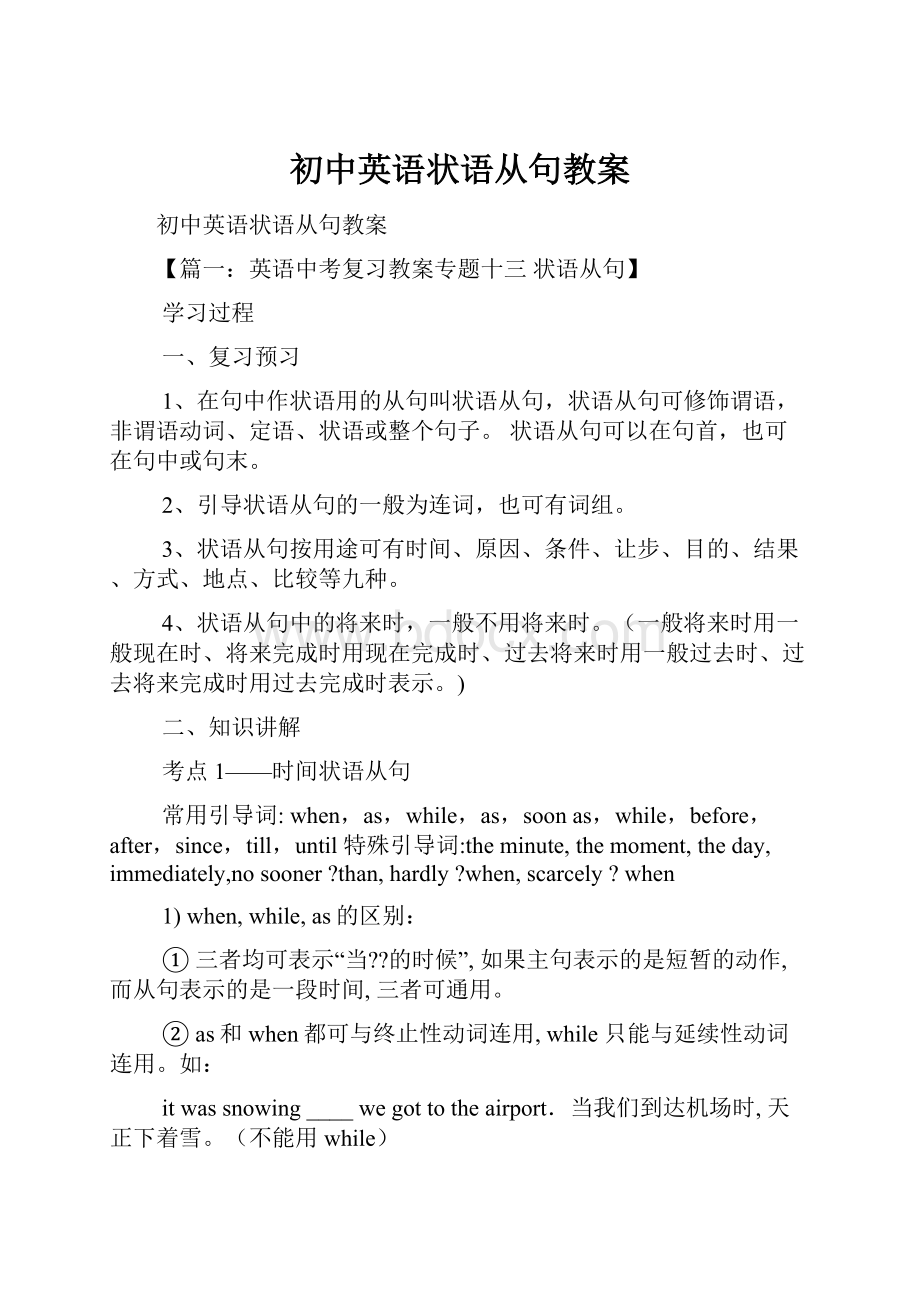初中英语状语从句教案.docx
《初中英语状语从句教案.docx》由会员分享,可在线阅读,更多相关《初中英语状语从句教案.docx(20页珍藏版)》请在冰豆网上搜索。

初中英语状语从句教案
初中英语状语从句教案
【篇一:
英语中考复习教案专题十三状语从句】
学习过程
一、复习预习
1、在句中作状语用的从句叫状语从句,状语从句可修饰谓语,非谓语动词、定语、状语或整个句子。
状语从句可以在句首,也可在句中或句末。
2、引导状语从句的一般为连词,也可有词组。
3、状语从句按用途可有时间、原因、条件、让步、目的、结果、方式、地点、比较等九种。
4、状语从句中的将来时,一般不用将来时。
(一般将来时用一般现在时、将来完成时用现在完成时、过去将来时用一般过去时、过去将来完成时用过去完成时表示。
)
二、知识讲解
考点1——时间状语从句
常用引导词:
when,as,while,as,soonas,while,before,after,since,till,until特殊引导词:
theminute,themoment,theday,immediately,nosooner?
than,hardly?
when,scarcely?
when
1)when,while,as的区别:
①三者均可表示“当?
?
的时候”,如果主句表示的是短暂的动作,而从句表示的是一段时间,三者可通用。
②as和when都可与终止性动词连用,while只能与延续性动词连用。
如:
itwassnowing____wegottotheairport.当我们到达机场时,天正下着雪。
(不能用while)
③as强调主句与从句表示的动作同时发生;while强调主句表示的动作持续于while所指的整个时间内;when可指主、从句所述动作同时或先后发生。
如:
hesangashewentalong.他边走边唱.
pleasewrite____iread.我读的时候,请写下来。
____hereachedhome,hehadalittlerest.回到家后,他休息了一会儿。
wheneverwemetwithdifficulties,theycametohelpus.
igotintouchwithhimimmediatelyireceivedhisletter.
mysistercamedirectlyshegotmymessage.
everytimeicatchacold,ihavepaininmyback.
如果把nosooner,hardly,scarcely,barely置于句首,它所连带的这部分要倒装,如:
nosoonerhadsheheardthenewsthanshefainted.
(shehadnosoonerheardthenewsthanshefainted.)
考点2——条件状语从句
常用引导词:
if,unless,(ifnot)
特殊引导词:
as/solongas,onconditionthat
①we’llstartourproject___thepresidentagrees.
②youwillcertainlysucceed__________youkeepontrying.
要点:
引导条件状语从句的连词有if(如果)、unless(除非)等,unless在意义上相当于if?
.not。
条件状语从句也像时间状语从句一样,如果主句用将来时,从句要用现在时代替将来时。
如:
youwillfail____youstudyhard.
(=youwillfailifyoudontstudyhard.)除非你努力学习,否则你会失败。
注意:
有时可以把祈使句作为条件从句,祈使句后面要搭配and,如:
cometomorrow,andiwilltellyou./persevereandyouwillsucceed.
givehimaninchandhe’lltakeamile.(=ifyougivehimaninch,he’lltakeamile.)
但:
当表示否定的条件时,可用连词or或otherwise,如:
makeupyourmind,oryou’llmissthechance.
startatonce,or/otherwiseyou’llmissthetrain.
(=ifyoudon’tstartatonce,?
)
(=unlessyoustartatonce,you’llmissthetrain.)
考点3——原因状语从句
(1)常用引导词:
because,since,as,nowthat
(2)because,since,as,for用法比较:
一).because:
语气最强,回答why引导的疑问句,该从句一般位于主句后,所表示的是直接理由,因果关系不能同so连用。
whyareyoulate?
becausethereisatrafficjam.
—whycantigo?
为什么我不能去?
—____youretooyoung.因为你年纪太小了。
二).since:
“既然?
..”表对方已知的事实或理由,从句常放在句首。
since比as正式。
sinceyouhavegotenoughmoneywithyounow,youcancomeandbuyitnexttime.
三).as:
“由于?
.”语气较弱较口语化,表明显的原因或已知的事实,从句常放在句首。
ashehadbeenreadyfortheworst,hewasnotdisappointedattheresult.____youarenotfeelingwell,youdbetterstayathome.
既然你不太舒服,还是留在家里的好
四).for是一个等立连词,连接的是两个并列的分句,其他三个引导的是状语从句;for不能放在句首。
itmusthaverainedlastnight,forthegroundiswet.
考点4——目的状语从句
常用引导词:
sothat,inorderthat
引导目的状语从句时,从句中常有can,could,may,might,would
①thebossaskedthesecretarytohurryupwiththeletters__________hecouldsignthem.
②theteacherraisedhisvoice_______________thestudentsinthebackcouldhearmoreclearly.
考点5——结果状语从句
常用引导词:
so?
that,such?
that
1.so?
that和such?
that引导的结果状语从句,意为“如此..以至于”,用来补充说明主句动作发生所带来的结果
theboyissoyoungthathecannotgotoschool
itissuchniceweatherthatiwouldliketogotothebeach
2.so?
that中so是副词,用来修饰形容词或副词:
so+形容词/副词/分词+that引导结果状语从句
hestudiedsohardthathemadegreatprogress
such?
that中such是限定词,只能修饰名词和名词词组,such+(形容词)+名词+that引导结果状语从句
mikeissuchanhonestmanthatweallbelieve
3.
(1)主+谓+so+adj./adv+that从句.
(2)主+谓+so+adj+a(n)+单数名词+that从句.
主+谓+such+a(n)+adj.+单数名词+that从句.
it’ssuchafinedaythatweallwanttogoouting.
=it’ssofineadaythatweallwanttogoouting.
(3)主+谓+so+many/much/few/little(少)+名词+that从句eg.
if修饰名词的形容词为many,few,much,little时,前面则用so,例如:
比较:
somany/fewflowers→suchniceflowers
somuch/littlemoney→suchrapidprogress
somanypeople→suchalotofpeople
(5)主+谓+such+adj.+复数名词+that从句eg.
(6)主+谓+such+adj.+不可数名词+that从句eg.
hegotup___earlythathecaughtthefirstbus.他起得很早,赶上了第一班车
it’s____agoodchancethatwemustnotmissit.机会很难得,我们一定不能错过hespoke___fastthaticouldntfollowhim.他讲得太快,我跟不上。
hetoldus____funnystoriesthatwealllaughed.他给我们讲了那么多有趣的故事,我们全都哈哈大笑。
考点6——让步状语从句
(1)常用引导词:
though,although,evenif/eventhough
特殊引导词:
nomatterwho/what/when/where/which/how(whoever,whatever,whenever,wherever,whichever,however)
①_____it’shardwork,ienjoyit.
尽管这工作很辛苦,我还是很喜欢。
②_________howhardtheworkwas,henevergaveitup.
不管工作多么艰难,他都从不放弃。
(2)whoever,whatever,whichever还可引导名词从句。
而nomatterwho/what/which只能引导让步状语从句
hedidn’twanttobedisturbed,nomatterwhowantedtoseehim.
=hedidn’twanttobedisturbed,whoeverwantedtoseehim.
i’llgivethebookstowhoeverneedsthem.
考点7——地点状语从句
常用引导词:
where
特殊引导词:
wherever(nomatterwhere),anywhere,everywhere
①airwillbeheavilypollutedwheretherearefactories.
②whereveryougo,youshouldworkhard.
wherethereisawill,thereisaway.
________________________.
whereveryougo,igotoo.
无论你去哪里,我都去。
whereilivethereareplentyoftrees.我住的地方树很多。
whereveriamiwillbethinkingofyou.不管我在哪里我都会想到你。
四、课堂运用
1.—mikewantstoknowif___apicnictomorrow.
—yes.butifit___,wellvisitthemuseuminstead
a.youhave;willrainb.youwillhave;willrain
c.youwillhave;rainsd.willyouhave;rains
2.—doyouknowwhenhe___backtomorrow?
—sorry,idont.whenhe___back,illtellyou
a.comes;comesb.comes;willcome
c.willcome;comesd.willcome;willcome
3.it_____tenyearssincethey____tofrance.
a.as;coveredb.was;havemoved
c.is;havemovedd.is;moved
4.he____waituntiltherain____.
a.wont;willstopb.wont;stop
c.will;stopsd.will;willstop
5.hewillgotothegreatwallifit___tomorrow.
a.wontrainb.doesntrainc.dontraind.isntraining
6.___youeatoldfood,youmaybeill.
a.beforeb.whyc.ifd.which
7.jackrunsas___astom.
a.fastb.fasterc.fastestd.much
8.30,000dollarsisalargeamountofmoney,butits____thanweneed.
a.formoreb.verymuchc.farlessd.verylittle
9.missgaoaskedaquestion,butitwas___thatnobodycouldanswerit.
【篇二:
状语从句教案】
状语从句
联系链:
1。
引导词的角度
(1)可以同时用于名词性从句和状语从句的引导词:
when,whatever,that,where
(2)可以同时用于形容词性从句和状语从句的引导词:
as,that,where,when
2.功能的角度
(1)状语从句具有副词的功能
(2)定语从句具有形容词的功能
(3)名词性从句具有名词的功能
3.从句所作成分的角度
(1)名词性从句充当:
主语,宾语,表语,同位语
(2)形容词性从句充当:
定语
(3)副词性从句充当:
状语
4.句子结构的角度
(1)状语从句和名词性从句成分完整
(2)定语从句成分不完整
5。
语序角度
状语从句倒装特殊句式
6。
连词角度
主从句的逻辑关系两个句子的关系并列句
知识链
1。
状语从句时间状语从句
地点状语从句
原因状语从句
目的状语从句
条件状语从句
结果状语从句
让步状语从句
比较状语从句
方式状语从句
2。
功能角度
在整个主从句中作状语
3。
从句关系角度
主从句中的主谓不一致
4。
主从句位置角度
可前可后
5。
语境角度
主从句逻辑关系选择连词部分连词引起的倒装
6。
时态的角度
时间状语从句和条件状语从句中,主句用将来时,从句一般用现在时
模型链
状语从句
定义:
在复合句中由从句表示的状语称作状语从句,它可以用来修饰谓语(包括非谓语动词)、定语或状
语,或是整个句子。
状语从句通常由一个连词引起,也可以由一个起连词作用的词组引起,有时甚至不需要连词直接和主句连接起来。
状语从句一般分为九大类(见下表)
1.时间状语从句:
在时间状语从句中,要注意时态一致,一般情况下主句是将来时的时候,从句要用一般现在时。
可以引导时间状语从句的连词很多,根据意义和主从句之间的时间关系,又可分类如下:
(1)表示同时性,即主从句的谓语动作同时发生或几乎同时发生。
其连词有:
when(当……的时候),while
(当……的时候),as(当……的时候),assoonas(一……就……),once(一旦……)等。
如:
strikewhiletheironishot.趁热打铁。
whileiamwashingthefloor,youcanbecleaningthewindows.(while含有对比的意思)
我洗地板的时候,你可以擦窗户。
as/whenicamehome,imetanoldschoolmateofmine.我回家的时候遇到了我的一位老同学。
i’llringyouupassoonasigetananswerfromhim.我一有他的答复就给你打电话。
onceyouseehim,youwillneverforgethim.你一旦见过他,就不会忘了他的。
(2)表示先时或后时,即主句的谓语动作发生在从句之前或之后,主要连词有:
after(在……之后),before
(在……之前),when(=after)等。
如:
after/whenthechildrenhadgonetobed,shebegantoprepareherlessons.(从句的动作发生在主句的动作之前,所以从句用了过去完成时)孩子睡觉了以后她开始备课。
hehadlearnedenglishforthreeyearsbeforehewenttolondon.(主句的动作发生在从句的动作之前,所以主句用了过去完成时)他去伦敦之前已学了三年英语。
itwasnotlongbeforeiforgotitall.(itis/was/willbe…before…是常用句型)
heranoffbeforeicouldstophim.(主句和从句的动作几乎同时发生,时态一致)
我还没来得及阻止他他就跑掉了。
(注意before在汉语中的译义)
(3)表示习惯性、经常性,即从句描述的不是一次性动作,而是经常发生的习惯性动作。
主要连词有every
time(每次),eachtime(每次),whenever(每当)等。
例如:
wheneverwemetwithdifficulties,theycametohelpus.每当我们遇上困难的时候,他们就来帮我们。
eachtimehecametotownhewouldvisitourschool.他每次进城,总要来看看我们的学校。
everytimeiwenttohishouse,hewasout.我每次去他家,他都出去了。
(4)表示持续性或瞬间性,主要连词有:
since(自从),eversince(自从),until(直到……才/为止),till
(直到……才/为止)等。
如:
itisjustaweeksincewearrivedhere.(itis/was…since…是常用句型)我们到这儿刚刚一星期。
(主句的动作或状态持续时间较短,不能用eversince)
youhavebeenreadingtomeeversincejameswentout.(ever放在since之前是用来表示说话者强调
主句动作或状态持续时间长)自从james走后你一直在给我朗读。
thebigclockwhichusedtostrikethehoursdayandnightwasdamagedduringthewarandhasbeensilenteversince.(eversince可以放在句末,since则不能)
这只一向日夜不停打点报时的大钟在战争中损坏了,从此就一直不响了。
myunclewenttotibetin1951.hehasbeenlivingthereeversince.我叔叔于1951年去了西藏,从那以后他一直生活在那里。
thingswentwelluntil/tillonenightanaccidenthappened.事情一切正常,直到有一天晚上发生了意外。
iknewnothingaboutituntil/tillhetoldme.(但untilhetoldme,iknewnothingaboutit.“till”不位于句首)他告诉我了我才知道。
2.地点状语从句
地点状语从句是由where(在……的地方),wherever(无论哪里)引导的:
wuhanlieswheretheyangtzeandthehanrivermeet.武汉位于长江和汉水汇合处。
wherethereisawill,thereisaway.有志者,事竟成。
you’dbettermakeamarkwhereyouhaveanyquestions.(这里where引导的从句不是定语从句)哪有问题,你最好在哪做个记号。
hewouldkeepintouchwithuswhereverhewas.他无论在什么地方,总是与我们保持联系。
3.原因状语从句
表示原因的状语从句可以由as(由于),because(因为),since(既然),now(that)(既然),consideringthat(顾及到),seeingthat(由于)等连词引导:
idoitbecauseilikeit.因为我喜欢我才干。
(because不能与so连用)
hecouldn’thaveseenme,becauseiwasnotthere.他不可能见过我,因为当时我不在那儿。
seeing(that)quiteafewpeoplewereabsent,wedecidedtoputthemeetingoff.由于好些人都没到会,我们决定延期开会。
nowthat/sinceyouareallhere,let’stryandreachadeci